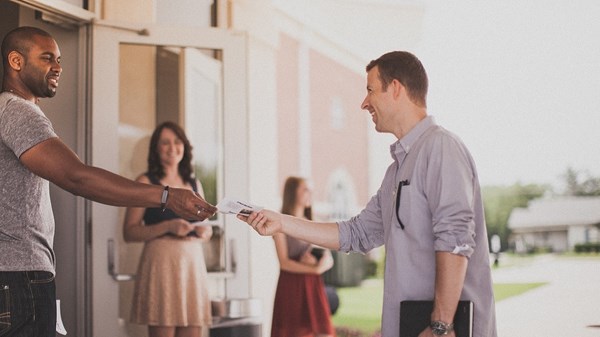
“How did you become a church secret shopper?” It’s a question I get asked almost weekly. It all started when I was a coach of church planters, while working for the Association of Related Churches (ARC), a church planting organization.
The president of ARC at that time (and my boss) was Billy Hornsby. Billy was a great mentor, friend, and a man of strong faith. He has since gone on to be with Jesus, but not before leaving his mark on me.
Billy and I were talking one day, and he looked at me and said, “Greg, you need to be a secret shopper.” I asked him to elaborate.
“You’ve been around awhile,” he said. “You’ve seen a lot. You’ve been a worship pastor and a tech pastor. You know churches and how they function.
“And,” he said, “I’ll give you your first endorsement!” So he sent out a message to the entire email list of ARC, encouraging pastors to bring me in for a secret shopper consultation. Pastors started contacting me, and the rest is history.
That’s how I got started nine years ago, and I still love doing church secret shopper consultations for churches of all sizes and denominations. Why am I so passionate about first impressions and showing hospitality to newcomers in our local churches? Here are a few reasons.
The Biblical Mandate
While hospitality may sometimes be perceived as a unique gifting for some people, Scripture is clear: loving strangers is a biblical mandate to anyone who follows Jesus. Throughout the Old and New Testaments, God specifically commands his people to practice hospitality. He tells the Israelites to “love the stranger” like they love themselves—reminding them that they, too, were once strangers:
When a stranger sojourns with you in your land, you shall not do him wrong. You shall treat the stranger who sojourns with you as the native among you, you shall love him as yourself, for you were strangers in the land of Egypt. I am the Lord your God (Lev. 19:33–34, ESV).
Jesus talks about the hospitable behavior of those who will inherit the kingdom: “For I was hungry and you gave Me something to eat; I was thirsty, and you gave Me something to drink; I was a stranger, and you invited Me in; naked, and you clothed Me; I was sick, and you visited Me; I was in prison, and you came to Me” (Matt. 25:34–36, NASB, emphasis mine).
When we welcome the newcomer and the least of these, and treat them as valued guests, we welcome Christ himself. And like so much of 1 John shows us, when we love others, we show our love for God.
Hospitality is also a specific hallmark for pastors and church leaders. In 1 Timothy 3:2 and Titus 1:7–8, Paul lays out important guidelines and criteria for church leadership. He tells the leaders of the church that they must be known for their hospitality.
Scripture repeats this emphasis: “Seek to show hospitality” (Rom. 12:13). “Be hospitable to one another without complaint” (1 Peter 4:9). “Let brotherly love continue. Do not neglect to show hospitality to strangers” (Heb. 13:1–2, emphasis mine). Read Acts chapters 16, 21, and 28. The Bible is full of stories illustrating the importance of practicing hospitality.
Because the command to love strangers is so prevalent throughout Scripture, we discover that showing hospitality is one of the primary signs of a follower of Jesus—and a church that follows Jesus. In fact, Jesus says that by loving others, others will know we are his disciples (John 13:35).
So there’s the biblical mandate as to why hospitality matters. In addition, there are personal and practical reasons.
When We Are the Stranger
When was the last time you visited a church? Maybe you were on vacation. Maybe you were visiting family. For me, I enjoy taking Sundays off to attend another church.
You may not remember the nervous feeling of walking into a new church. How long has it been since you felt lost in a church building? Unfortunately, I’ve been to plenty of churches where I wound up getting lost, especially in large churches—everything from not knowing where the worship service was to desperately trying to find a restroom. So many times, no one was there to show me the way. On the practical side, this feeling of “lostness” is why hospitality or guest services ministry is vital to every church.
As my friend and author Mark Waltz writes in his book, First Impressions: “You've got 10 minutes. Somewhere between the parking lot and the children's center, the 10 minutes pass. ... They should know they matter to us before they hear how much they matter to God."
When someone in your church invites a friend, especially a non-Christian, to visit your church, he or she hopes everything will be perfect. So take a few moments to put yourself in the shoes of an inviter. Here are a few of the major areas in which things could go very well for you and your guest—or very poorly.
The Entrance
You bite your nails as you wait in the lobby to greet your friend and guest. You hope the parking lot attendants are smiling, waving, and pointing your friend to first-time guest parking. You hope your friend is greeted warmly as she and her child walk up.
You pray that the check-in procedure for your first-time guest is smooth and efficient. You hope your guest’s child is greeted by comforting, welcoming faces, giving your friend the confidence needed to drop off her child in a foreign environment with strangers. You hope the children’s ministry rooms are clean, safe, and secure.
When you walk your guest to the Information Center, you pray she will encounter someone who knows and does the job well. You think, This is my friend for whom I’ve been praying for three years. Can you make her want to come back? Can you help her see Jesus through your actions and words?
The guy at the Information Center does his job. Your guest receives a welcome packet, which includes a welcome note from the senior pastor and info on the vision and values of the church. Then she is pointed in the right direction of the service.
The Service
Together, you and your invitee walk into the auditorium and determine where to sit. The back isn’t an option because it’s difficult to see the front and you don’t want your guest to feel disconnected. You wonder, When is the church going to invest in IMAG so we can see the pastor’s face when he’s preaching?
You hope someone will come over and introduce himself or herself and welcome your friend. Why? Because friendliness puts people at ease. It helps them feel welcomed and safe.
So you sit with your friend and make small talk, all the while trying not to worry. Then it hits you: The sermon! What if the pastor talks on sin? What if he preaches on Hell? And then you almost have a heart attack. What if he preaches on money?
These thoughts race through your people’s minds each week. Please understand, all these topics are fine and should be taught on, but try to remember your whole audience. When you have guests, you need to help them lower their defenses. Speak to everyone with wisdom, from the mature Christian to the lost person who doesn’t even own a Bible.
With your guest in mind, you pray there aren’t 10 announcements that nobody cares about. You pray the pastor isn’t selling his book in the lobby. You hope they don’t ask visitors to raise their hands. No guest likes that, and most will never return.
Every week your people pray there isn’t any insider talk or Christianese. They cringe when you casually say words like atonement, judgment, justification, and sanctification without explaining them in simple terms.
It’s okay to use big words as long as you explain them and why they matter. Describe the good news that comes from such rich words. Break it down to a child’s level and never assume people know what you’re talking about. Never.
At the end of the service, the pastor announces, “If you’re a first-time guest, please bring your communication card to the Guest Services table in the lobby, and we’ll give you a gift just to thank you for coming. No strings attached. As a matter of fact, we want to buy you dinner and a movie!”
You ask your friend what she thought of the service. She smiles and says, “I really liked it. Now, I want to go get my free gift!” Just as your blood pressure is starting to come down, you remember, We’re not home yet!
The Exit
You go with your friend to the lobby and point out the Guest Services table. Your guest is greeted by a smiling face who takes your friend’s card, gives her a gift bag, and thanks her for coming. Inside the gift bag is an individual microwave popcorn package, with a RedBox code taped to it, along with a coupon for a free pizza—“Dinner and movie!” You start to breathe easily as your guest chuckles.
Your friend starts walking in the direction of the children’s area, and you wonder how she remembered where to go. Then you notice the directional signage regular members or attenders never notice. You smile and think, Someone has thought this through. I’m so proud of my church.
Your friend goes to pick up her child and gives her matching sticker to a childcare worker, ensuring safety and confirming that the right kid goes home with the right parent. Your friend remarks that she likes this protocol.
Your guest bends down to her child’s eye level and asks, “So, what did you think of your class?” The child smiles wide and shouts, “We made pictures of Jesus and learned about a man named Nicodemus.” Your friend hugs her child and says, “Very cool.”
Your blood pressure is now back to normal, and you are filled with relief.
You offer to take your guest’s family to lunch, and she accepts. This, my friends, is hospitality at its finest. Encourage your congregation and small group leaders, if they can afford it, to invite a guest to lunch after the service and to listen as they tell of their experience. There’s so much that can be learned from that. It also strengthens the bond between congregants and their guest.
Finally, I would encourage you to pray for and expect guests. Always remember, it’s likely somebody’s first time visiting your church. How will they be treated? How will they feel during the worship service and after they leave? What will they take away from the message and experience as a whole? And lastly, will they return? That’s what hospitality does.
Greg Atkinson is the founder of Worship Impressions and author of Church Leadership Essentials, Strange Leadership, and Secrets of a Secret Shopper.

Support Our Work
Subscribe to CT for less than $4.25/month


























